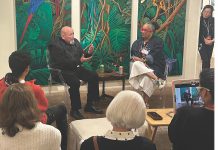Pajaro Valley Unified School District’s governing body on Wednesday took the first step toward allowing students to vote in district elections and help choose the trustees that represent them.
The board voted to form an ad-hoc committee that will talk to students, families and community members and research the legal implications of lowering the voting age to 16. The committee will report its findings to the board.
Trustee Gabe Medina, who created the “Student Promise Proposal,” said that he promised students during his campaign that he would give them a voice at the table.
“Students suffer direct impact from school board decisions, yet lack formal representation,” he said.
If ultimately approved—Medina estimated that could take about four years—it would lower the voting age to 16 for PVUSD trustees.
Allowing them to participate could boost attendance and activism, Medina said.
“Students who already lead walkouts, advocacy campaigns and coalition building now need the ballot to match their voices,” he said.
He pointed to Oakland Unified School District, where 67% of voters supported Measure QQ, which gave young people the right to vote in elections there. The measure added some 8,000 new voters to the roster.
Several people spoke about the issue, all of them in favor of allowing students to vote.
“The students should be able to hold the trustees accountable for their actions,” said Pajaro Valley High School junior Maximiliano Barraza Hernandez, who pointed out that former board members “expressed indifference and even antagonism” when students addressed them.
“As a 16-year-old, I know it would be a game-changer to be able to vote for board members, because I remember having to fight really hard just to be able to support people who represented me,” he said.
PVHS sophomore Ixel Barraza said she has been speaking at board meetings for two years. Allowing students to vote, she said, would make them more a part of their community.
“I feel like as students we need the right to vote, because I don’t want adults speaking for me without even asking what I think,” she said. “We are affected by the decisions of the board members who we don’t even get to elect. It’s unfair for us to not have a voice.”
Trustees Medina, Jessica Carrasco and Carol Turley volunteered to be on the committee.
Trustee Misty Navarro warned that a similar issue came before the Watsonville City Council, and that the city’s charter only allows citizens 18 and older to vote.
“Hopefully you can figure out a way around that,” she said.
Navarro also said that the district comprises two counties, and that lowering the voting age in only one could create equity issues.
In other action, the trustees rejected a vote of no confidence against Board President Olivia Flores, Vice President Misty Navarro and Superintendent Heather Contreras.
Medina, who brought the issue to the board, said he has seen a failure of leadership that includes unequal treatment of schools, blocking his requests to place items on the board agenda and disrespect during closed meetings that has not been addressed.
“What we’re seeing is not just dysfunction,” Medina said. “It’s leadership that abandons transparency, fairness and core values of public service.”
As one example, Medina said that the board declined to discuss the removal of critical youth programs, but held a vote on placing uniformed police officers on high school campuses that Trustee Joy Flynn requested—and during a meeting when she was absent.
“That’s not procedural oversight, that’s political opportunism,” Medina said.
He also said that the board has failed to hold Contreras accountable when she did not respond to trustees’ request for information.
The trustees rejected a motion by Medina to table the issue until Trustee Joy Flynn could be there.
Navarro said that the agenda-setting committee has been grappling with packed agendas, and that the decisions they made had nothing to do with Flynn’s absence.
“Had trustee Flynn asked us to table this, we would have, but she did not,” Navarro said.
Several people addressed the board, both in favor and against the proposal.
“Of all the things we should be talking about—the budget, closing schools, declining enrollment, improving academic performance—we’re here to consider a no-confidence vote,” said Bill Beecher. “Talking about the pot calling the kettle black. Trustee Medina wants a no-confidence vote when he has been the major source of disruption for this board.”
Beecher asked that the issue be “tabled forever.”
“Let’s work on real stuff,” he said.
Eli Davies said that they have appreciated Medina’s stances on issues they feel are important to the community.
“If you look at actual items and policy, (Medina) speaks for the community, thinks about what the community needs,” Davies said. “To call him the divisive one is really coming from a place of not knowing the intricacies of what’s happening here.”
Gabriel Barazza said that Martin Luther King Jr. was criticized as being divisive during the Civil Rights movement.
“I always find it amusing that people who want to preserve the status quo and systems that are unjust and are not serving the community always tend to hide behind civility and respect,” he said.










Anyone else notice that the pro-Medina voices quoted are connected to PVESJ who bragged about putting him and his mostly silent partners on the school board? I didn’t until they all listed their names on that opinion they wrote for this paper two weeks ago. There is no support for this clown aside from the people that Christine Hong orders to defend him. This is all manipulation by a power hungry group of unelected activists.
I wish that PVESJ cared as much about improving education as they do about indoctrinating children.
The teachers’ union contributed $7,500 to the campaigns of Medina and Turley. These individuals serve as spokespeople for the union’s agenda. PV4ESJ is predominantly comprised of teachers, who are, by definition, union members. It is evident that PVFT has actively installed its members onto the school board. Furthermore, they utilize an astroturf organization, masquerading as concerned community members, to disseminate their talking points. Lowering the voting age represents another attempt by PVFT to consolidate power. Sixteen-year-olds are impressionable and often defer to their teachers, whose primary interests align with the union, not necessarily with the school district or the students. In tightly contested races, such as Medina’s, even a small number of additional votes can significantly alter the outcome.
That is a shamefully biased description of the meeting and what was discussed, Todd!
Thank you for your thoughts. I’d like to hear more. I encourage you to write a letter to the editor.
https://pajaronian.com/submit-letter/
Thanks but no. You’re the reporter or if you prefer, journalist. Read the Lookout account of this meeting for a more objective description of that meeting. You have another chance tonight.